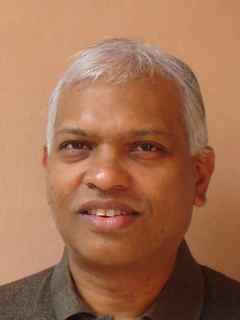 Indian social scientist and economist Arunava Sen has been named the winner of the first-ever TWAS-Siwei Cheng Prize in Economic Sciences for his innovative research into human political and economic behaviour.
Indian social scientist and economist Arunava Sen has been named the winner of the first-ever TWAS-Siwei Cheng Prize in Economic Sciences for his innovative research into human political and economic behaviour.
Sen is well-known for his study of how institutions function, and how people both governing and operating within those institutions strategize to get the outcomes they desire. Sen’s work has had influence on the design of voting systems, auctions, and systems for providing public services.
“I am delighted and deeply honoured to receive the Siwei Cheng Prize from The World Academy of Sciences,” Sen said in an email. “I have known of TWAS all of my academic life as an institution of the highest quality and the noblest goals. It is therefore extremely gratifying and humbling to receive recognition from them.”
This is the inaugural year of the TWAS-Siwei Cheng Prize, which is funded by the Siwei Cheng Foundation of the Education Foundation of the University of Chinese Academy of Sciences. The award recognizes economic scientists who have been living and working in a developing country for at least 10 years, and includes a prize of USD10,000. Sen’s honour was approved at the annual TWAS Council Meeting in Trieste, Italy, on Wednesday, 13 December.
Human beings often interact to make decisions that require collective behavior, or at least cooperation – from voting to trading. To get the outcome they want, such as government policies or a chance to buy a desired object, they may act strategically in an attempt to influence the outcome in their favor. Voter might not vote for their ideal candidate, but for their second-most prefered candidate instead, in order to have a greater chance at winning. In an auction, a buyer will bid while weighing the price against the probability of winning the auction.
The design of the governing institution – the laws of a democracy or the rules of an auction – profoundly determines the strategic behavior of these individuals. Sen researches how differently designed institutions induce people to set different strategies, and develops theories to explain peoples’ collective strategic behavior.
His most well-known work specifically focuses on “mechanism design,” a field that emerged roughly 50 years ago as a new a way to analyze political and economic organisations. It explores the tradeoffs people make between efficiency, fairness and incentives when making decisions within an institution that has rules participants must operate by.
Sen has established a reputation as one of the leading scholars in this field. He has also built an understanding of what happens when institutions are able to or refuse to change, how much information people have about others, the effects of collusion between individuals, and the relative ineffectiveness of truth-telling for individuals attempting to achieve their goals.
Sen made the decision to return to India following his doctoral work in Princeton and has since become a significant presence in Indian economics. He also has been instrumental in kickstarting the careers of many young economists in India by supervising and guiding them through research work. Sen came to the Delhi centre of the Indian Statistical Institute in the late 1980s and has remained there ever since. More than 10 students have completed their PhDs under his supervision.
This topic lies at the heart of much of modern economics and San’s work was heavily cited by the winners of the 2007 Nobel Prize in Economic Science. He has also been published in leading economics journals like Econometrica, Journal of Economic Theory, Theoretical Economics, and the Review of Economic Studies.
About Siwei Cheng
The TWAS-Siwei Cheng Prize is named after the renowned Chinese scholar Siwei Cheng (1935-2015), an economist, chemical engineer and political leader. He is most well-known as a driving force behind the establishment of ChiNext, a stock exchange designed to provide venture capital in technology companies. His work has had a profound impact on both the Chinese and global economy.
About TWAS
The World Academy of Sciences for the advancement of science in developing countries – TWAS – works to advance sustainable prosperity through research, education, policy and diplomacy. TWAS was founded in 1983 by a distinguished group of scientists from the developing world, under the leadership of Abdus Salam, the Pakistani physicist and Nobel Prize winner. Today, TWAS has more than 1,200 elected Fellows from 96 countries; 15 of them are Nobel laureates. The Academy is based in Trieste, Italy, on the campus of the Abdus Salam International Centre for Theoretical Physics (ICTP). Through more than three decades, its mission has focused on supporting and promoting excellence in scientific research in the developing world and applying scientific and engineering research to address global challenges. TWAS receives core funding from the government of Italy and essential programmatic funding from the Swedish International Development Cooperation Agency (Sida). The United Nations Educational, Scientific and Cultural Organization (UNESCO) administers TWAS funds and personnel.

